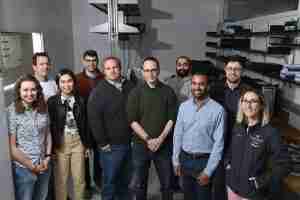
Salubris Biotherapeutics Eyes Phase II Following Positive Data from Heart Failure Trial
By Alex Keown
May 24, 2023
Clinical data demonstrating the potential efficacy of Salubris Biotherapeutics’ experimental asset JK07 places the Gaithersburg-based company on a path to potentially providing a treatment for a broad spectrum of heart failure issues.
SalubrisBio, the first company to bring a bispecific antibody into clinical trials in a cardiovascular indication, presented the data from the Phase Ib heart failure with reduced ejection fraction (HFrEF) trial during the annual congress of the European Society of Cardiology’s Heart Failure Association. Data showed that following a single administration of JK07, patients in all dose cohorts saw improvement in ejection fraction through 90 days. The data presented at the conference included information from more subjects, as well as longer-term follow up data and additional analyses than seen from the positive interim data shared in September 2022 by the company that launched in 2016 in the BioHealth Capital Region.
Key findings presented at the congress include robust dose-dependent biomarker changes that demonstrated target engagement at all dose levels, as well as meaningful changes left ventricular ejection fraction across all dose groups compared to placebo. JK07 was well-tolerated with most adverse events mild to moderate. Only one serious adverse event occurred (Grade 3), at the top dose level.
Chief Executive Officer Sam Murphy told BioBuzz he was encouraged by the data seen across all three dose levels in the Phase Ib study. He said the activity seen is clinically meaningful and raised interest among congress attendees. There are few therapies currently in development for a broader spectrum of heart failure, he said.
“That’s a very big deal,” Murphy said.
JK07 is the first investigational antibody fusion protein and first selective ErbB4 agonist to enter clinical development for heart failure. JK07 simultaneously blocks HER3/ErbB3 signaling, while selectively stimulating the HER4/ErbB4 pathway. Additionally, the data showed treated patients saw improvements in the structure of the heart, which is what SalubrisBio expected to see based on previously-seen animal data, Murphy said.

Although Maryland has a reputation as a cornerstone in cell and gene therapy development for cancers and rare diseases, cardiovascular research is also part of the ecosystem. Cardiovascular disease is a core research focus at the University of Maryland School of Medicine. Research teams from the school have played a significant role in cardiovascular research, including the role of calcium sparks in myocardial physiology, the discovery of the first null mutation in APOC3 gene conferring cardioprotection, as well as the demonstrations of clinical effectiveness of implantable defibrillators and beta-adrenergic blockers.
Likewise, researchers from the Johns Hopkins Heart and Vascular Institute are making discoveries that advance the care and treatment of heart and vascular conditions. There, researchers are delving into numerous areas of heart research, including the regenerative capacity of cardiovascular progenitor cells and the potential of recreating adult heart tissue for the treatment of heart disease.
Heart failure affects approximately 6.2 million people in America and more than 64 million people across the globe. Heart failure with reduced ejection fraction (HFrEF) and heart failure with preserved ejection fraction (HFpEF) each affect over 3 million patients in the U.S. alone. Heart failure is a chronic condition in which patients experience progressively worsening symptoms and quality of life, hospitalizations and death. JK07 is in development for the treatment of both HFrEF and HFpEF.
With positive Phase I data, SalubrisBio is now eying a potential Phase II trial. The company will meet with the FDA later this year to discuss the next study, which will assess JK07 as a potential treatment for HFrEF, as well as in heart failure with preserved ejection fraction (HFpEF), a condition where the heart pumps normally but the left ventricle does not fill with enough blood for the body. The company had been running a Phase Ib trial for HFpEF but halted it with the expectation SalubrisBio will be able to move straight into Phase II, Murphy said.
“Our molecule seems to work well across the spectrum, there’s no issue having two separate development paths for the molecule,” he said.
If the FDA agrees with SalubrisBio’s trial design, Murphy said the Phase II trial would likely include about 300 patients and could begin before the end of 2023. If that timeline is maintained, a topline data readout could be available in 2025.
“The durable and sustained responses observed, coupled with a favorable safety profile, support further investigation of JK07. We look forward to building upon these findings with the initiation of a Phase II trial later this year,” Murphy said.
The JK07 data was announced approximately two months after SalubrisBio secured $35 million in funding from its parent company. Those funds will not be sufficient to finance the Phase II JK07 trial, as well as a study of the company’s experimental oncology asset, JK08, which is a potential monotherapy for solid tumors. Data from that study are expected later this year. Murphy said the study of JK08 is “moving quickly and favorably” toward the next part of its ongoing Phase I/II study.
In 2022, the company received $32 million from its Chinese parent company. Murphy noted SalubrisBio continues to have the support of its founding company.








